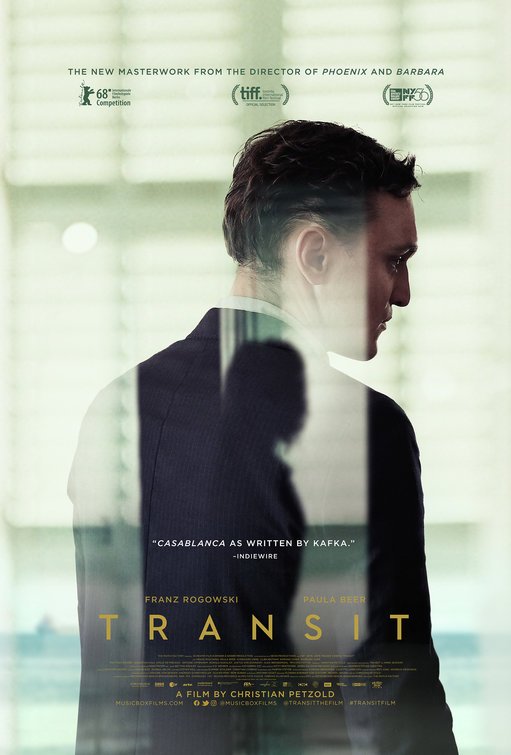What You Need To Know:
The plot to TRANSIT is a structural nightmare, with multiple plot threads and some ill-defined character motivations. Making matters worse, the story unfolds very slowly. Filling the story with some red herrings doesn’t help matters. Finally, the acting veers from poorly done to merely serviceable. TRANSIT is a movie about refugees during a time of international crisis, but doesn’t offer anything more compelling than that. The main characters are not that interesting. As a result, the point of the movie gets lost. TRANSIT also contains a bloody suicide scene, some foul language, and marital infidelity. Extreme caution is advised.
Content:
More Detail:
TRANSIT is a German-French drama set in the near future in the French port of Marseilles where people are trying to escape a new growing fascist occupation of Europe. TRANSIT moves too slowly, the acting is not particularly outstanding, the plot meanders, there’s some foul language and extramarital affairs, the ending is depressing but even so on a possible but weird hopeful note, and the director’s personal vision for his movie is confusing if not obtuse.
Using tropes from World War II movies like CASABLANCA, the movie opens in Paris where there’s a new growing fascist occupation of Europe nearing the city. Georg, a German immigrant, is asked by a friend in the French Resistance to deliver letters to a German writer named Weidler. One letter is from the Mexican consulate in Marseilles about getting a visa and another letter is from his wife, who left him but wants to return. The friend promises Georg a seat on a train car going to Marseilles, where he can try to get a visa to Mexico for himself.
However, when he gets to the writer’s apartment, Georg finds that the writer has committed suicide. So, Georg takes the writer’s manuscript and the letters and hooks up with members of the Resistance, who ask him to help a seriously wounded man onto the train car that will secretly take them to Marseilles.
During the trip to Marseilles, the wounded man dies, and Georg barely escapes the police. When he gets to the Mexican consulate, he takes the writer’s identity, and the consul informs him he must travel by way of a visa from the United States. At the U.S. consulate, the bureaucrat in charge informs Georg that the writer’s wife, Marie, has been looking for him.
Eventually, Georg meets Marie but doesn’t tell her about his suicide and about his efforts to use her husband’s transit papers to leave France. By a weird coincidence, Georg also meets the doctor that Marie had planned to escape with before she changed her mind. Georg falls for Marie, and complications ensue as he, Marie and the doctor try to get the necessary transit papers to leave France. Who will leave with whom aboard the ship sailing for the New World? Will Georg ever tell Marie the truth about her husband?
The plot to TRANSIT is a structural nightmare. This review hasn’t even begun to mention a major subplot that occurs in the story, which complicates the plot even more. Eventually, the writer’s widow, Marie, keeps changing her mind about leaving France or staying in France to continue searching for her husband. Make up your mind already, lady!
Making matters worse, the story of TRANSIT unfolds very slowly. Filling the story with some red herrings doesn’t help matters. Finally, the acting and the character development veer from poorly done to merely serviceable.
Clearly, TRANSIT is a movie about refugees during a time of international crisis. It’s based on a novel about World War II, but the director decided to move the story into the near present. So, the movie doesn’t tell viewers much about the details concerning the fascists coming to occupy Paris, then Marseilles, which was a refugee zone during World War II, as briefly depicted in the classic movie CASABLANCA. That said, the only refugees in the movie who really garner any sympathy are the other refugees Georg meets in the movie, including a boy and his mother (the family of the man who died on the train), a music conductor who’s been offered a job in South America and a woman using transit papers from a friend who wants the woman to bring the friend’s two dogs with her to Mexico. Sadly, the story of Georg, Marie and the doctor are not as appealing or captivating, and their story moves much too slowly than necessary. As a result, the point of the movie gets lost.
TRANSIT also contains some images of the bloody aftermath of the writer’s suicide, which occurred in his bathtub. There’s also some foul language. Finally, even though the lead female character, Marie, keeps looking for her husband in the movie, she does take up with Georg at one point in the story. Even Georg veers from being selfish to being altruistic. The character motivations in TRANSIT are as confused and unappealing as the points that the movie seems to be trying to make.



 - Content:
- Content: 







